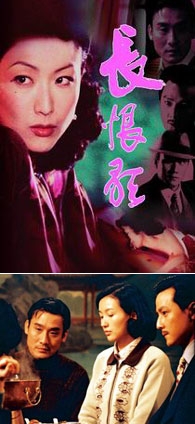You cannot imagine my delight upon hearing Stanley Kwan's Everlasting Regret (长恨歌) has been selected for competition at the 62nd Venice Film Festival. For me, Stanley Kwan is synonymous with that brand of Hong Kong arthouse melodrama that has given Asian cinema some of the most chic and elegantly shot profiles of our iconic actresses. And being the self-respecting drama queen that I am, how can I resist this offering?

The first quarter of the film managed to invoke an Old Shanghai seething with glamour, and seedy under dealings. It is an epoch of belles sitting side-by-side with powerful crime lords, drinking champagne or sipping a cup of hot Chinese tea in some private abode. There is a breathlessness in the editing (courtesy of the brilliant William Chang) that managed to capture the enervating sights and sounds of this bygone world.
But for those who are unfamiliar with the socio-political backdrop of the novel (by award-winning author Wang An Yi) from which this film is adapted, the story can be reduced to the love-hate relationships between Qi Yao and the various men in her life. The plot might be so "tell me about it�" but hold your horses, for you are in for a real treat!
Watch the screen smoulder as some of our sexiest Asian male dreamboats (discounting Tony Leung Ka Fai who, I'm sorry to say, used to turn some pricks in his The Lovers' days circa� let us dispense with temporal specifics, shall we?) play out the game of love and seduction with Canto-pop diva Sammi Cheng as the eponymous heroine. The latter more than held her sway against these guys I must say, despite invariantly getting her heart broken at the end of their tragic two-steps, when the men either die or disappear.
With a face that launches a thousand drag routines, the role of Qi Yao is quite a departure for Sammi from her previous screen personas. With her crisp features and poise she is utterly convincing as the headstrong and not-quite-innocent heroine in her early years. It is an understated performance that managed to straddle subtle intelligence and impassioned vulnerability. It is also a performance that recalls the best screen moments in Asian cinema of long-suffering ing�nues a la Maggie, Gong Li, the late Anita Mui, etc.

Also, Everlasting Regret as a melodrama holds a promising start that unfortunately peters out into lugubriousness. Though director Kwan always has a facility with screen adaptations, as is attested by his previous critical successes Red Rose, White Rose and Lan Yu (which opens in Singapore in October), his latest effort seems less able in handling the wealth of material in the novel of Wang An Yi.
It is no small feat bringing Wang's novel to the big screen. Widely considered a contemporary Chinese literary classic, Wang's novel is not simply about the trials and tribulations of her heroine as she strides through the waves of China's socio-political history. It also is not just a character study richly written.
The heroine is herself a metaphoric reflection of the city of Shanghai: ever changing, ever adapting and adaptable, ever elusive; a chameleon, a survivor. To forget, one needs the luxury of time. In forgetting, one is aware of the impossibility of permanence; to forget is to watch the ghosts of deeds undone and words unsaid drown in time's lethean flood. The regret, however, is that forlorn feeling borne of the awareness that though memory is itself tenuous and prone to flawed re-imaginations, it is also cruelly tenacious. This concern with the passage of time seems only to have been dealt with superficially in the film. The latter does at time occur to me as merely a starring vehicle for Sammi. Which is not a bad thing in itself, but I would like to see more of the novelistic intentions being foregrounded.
On the up-side, permit me one last word before I too depart for the rubbish heap of last year's film reviews: though Daniel Wu remains the ubiquitous gay guy's wet dream fantasy, Everlasting Regret will provide yet another specimen to tip the boat upon the raging sea of male lust. He is none other than newcomer Huang Jue, and he is beautiful! With a capital Butt, emmm� I mean "B." Money shot alert! In bubbly red undie to boot�
Like the male version of Ms Geisha Zhang Zi Yi, Huang Jue was a dancer before his foray into film-acting Let us cross our fingers for future collaborations between this hubba-hubba find and director Kwan; we wildly anticipate the pink version of 2046. Or better yet, "The Memoirs of a Toyboy."











 Printable Version
Printable Version










